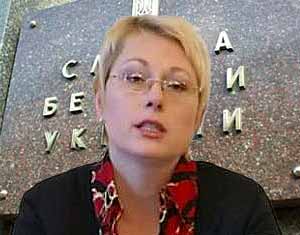30.11.2008
November 26, 2008 (The date of publication in Russian)
Alexander Rublev
WITCH-HUNT IN TRANSCARPATHIA
Glitzy intelligence cracks upon minority leaders
 In his address to the visitors of the November 23 public event, commemorating the victims of the 1933 famine (presented in Ukraine as an act of deliberate ethnic extermination), Victor Yushchenko urged Russia to denounce the crimes of Stalinism. Days before, Yury Sergeyev, Ukraine's Ambassador at the United Nations, rejected the Russia- sponsored resolution denouncing glorification of Nazi collaborators, claiming that instead, the global community should concentrate on the cult of Iosif Stalin, allegedly revivified in Russia.
In his address to the visitors of the November 23 public event, commemorating the victims of the 1933 famine (presented in Ukraine as an act of deliberate ethnic extermination), Victor Yushchenko urged Russia to denounce the crimes of Stalinism. Days before, Yury Sergeyev, Ukraine's Ambassador at the United Nations, rejected the Russia- sponsored resolution denouncing glorification of Nazi collaborators, claiming that instead, the global community should concentrate on the cult of Iosif Stalin, allegedly revivified in Russia.
However, Ukrainian powers have overlooked the revival of Stalinism in the practice of their national special services. Officials from Ukraine's Security Agency (SBU) have spent months searching for valid evidence of Moscow's deliberate "organization of the famine", as well as for avouching non-involvement of OUN-UPA mercenaries in Nazi crimes in Western Ukraine.
Digging in NKVD archives seems to have strongly impressed some top SBU officials, resulting in an unexpected and precarious shift. Consciously or subconsciously, they started implementing NKVD's methods of late 1930s for excoriating dissent in today's Ukraine.
The public statement of SBU's acting chair Valentin Nalivaichenko is most illustrative. He amazed the public with the conclusion that Rev. Dmitry Sidor, leader of the Rusyn national movement, is a foreign agent, while the movement itself is "financed from Moscow through support of Rusyn secondary schools".
Mr. Nalivaichenko's way of thinking sounds pretty familiar for historians and former political convicts. Suspicions of "aiding and abetting to British, French, Polish and Japanese intelligence" were typical for the investigative practice of NKVD bosses Nikolay Yezhov and Lavrenty Beria. The only difference is that at that time, Rev. Dmitry would be labeled a "national deviationist", while today's SBU accuses the priest of separatism and assault on Ukraine's territorial integrity.
What kind of sensitive secrets of Ukraine could Rev.Dmitry have disclosed to the Russian side? Was that the information that Rusyns, the indigenous people of Trascarpathia, are not identical to Ukrainians, along with the material evidence of a Rusyn ABC book, or classified data on the number of this minority?
In fact, this information is available in every European country where the existence of Rusyns is officially recognized and not debated. Wikipedia identifies Rusyns as "a Slavic ethnic group which speaks the Rusyn language and is descended from the minority of Ruthenians who did not adopt the ethnonym Ukrainian to describe their ethnic identity in the nineteenth and early twentieth centuries". In 2006, the UN Committee on the Elimination of Racial Discrimination (CERD) urged Ukraine's government to recognize Rusyns as an ethnic minority.
However, UN's view is regarded by Ukrainian authorities as somewhat unimportant. In a similar way, Turkish officials earlier denied the existence of Kurds identifying them as "highland Turks" and their languages as a Turkish dialect.
Are Rusyn leaders really assaulting Ukraine's integrity? The Second European Congress of Rusyns, held on Ovctober 25 in Mukachevo, Transcarpathian Region, urged the Government of Ukraine to re-establish Rusyn autonomy in the form that existed in Czechoslovakia in 1938 – namely, as an autonomous republic. The Congress recommended that the Transcarpathian Region's Rada issue a relevant legislative act before December 1.
Curiously, this demand is shared by Yevgeny Zhupan, a deputy representing Our Ukraine, the political party backing President Victor Yushchenko. This politician reminds that the struggle of Rusyns for autonomy has also got an economic background: the minority fears that the picturesque area of "Carpathian Switzerland" might be cheaply sold to Kiev tycoons, the native population being deprived of lands. The supposed separatism in fact reveals resentment with corruption of regional authorities.
SBU's officials seem to be poor in legal education, particularly in constitutional law. Studying current European practice rather than 80-year-old NKVD instructions, they could get acquainted with the guarantees of autonomy available for the Scottish and Welsh population in Great Britain, as well as the Italians of Switzerland's Southern Tirol, or the French in Canada's Quebec. The central governments of these countries are not necessarily delighted with the desire of minorities to elevate their status, but nevertheless conduct a civilized dialogue with its representatives. Even those political movements that express the desire of independence are not persecuted in EU states in case their activity is not anti-constitutional.
However, Kiev officials, and particular Mr. Nalivaichenko's subordinates, don't bother to study law. They are probably too busy for such kind of subtleties. Mr.Nalivaichenko is busy struggling for the post of Chair of the President's Secretariat. SBU's press secretary Marina Ostapenko who warns about "new facts of anti-national activities" of the Rusyn movement, spends time posturizing for Avenue Magazine in a vamp’s image.
Ms. Ostapenko's didactic discourse on breast augmentation and visiting strip bars that surface in magazines for "adult girls" might be serving as an element of SBU's image strategy, intended to impart some glamour to the government agency. However, the features of an oppressive machine too obnoxiously penetrate through this glamour.
Before accusing Russian authorities of neo-Stalinism, Ukrainian leaders should look back at their own practice. Interrogation of supposed dissidents and pressure upon minorities is not a policy greeted in the European community that the official Ukraine is so longing to become a part of.
Number of shows: 1275
 ENG
ENG 

 ENG
ENG 
